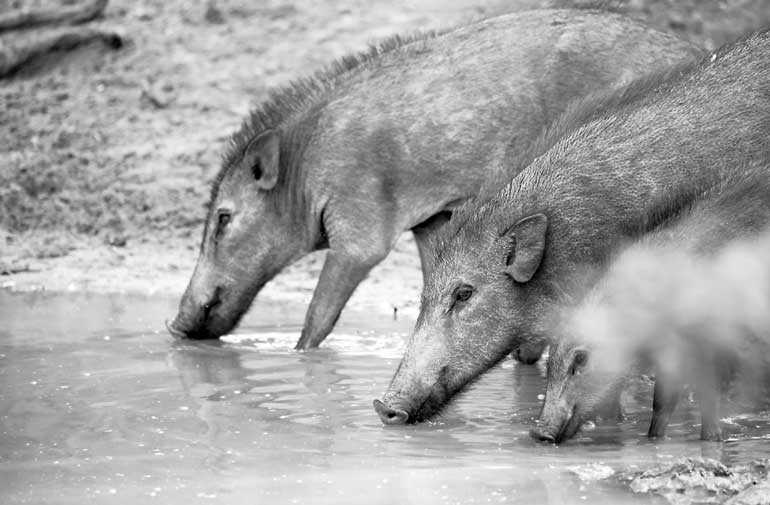Monday Feb 23, 2026
Monday Feb 23, 2026
Saturday, 6 October 2018 00:09 - - {{hitsCtrl.values.hits}}

As a conservation organisation Wildlife and Nature Protection Society (WNPS) is committed to protect all species. The wild boar or pig is no exception. Although the wild boar is considered an agricultural pest and can be killed by farmers, during daylight hours and makes the F.F.P.O.’s negative list, together with a handful of other species, from an ecosystem perspective, it is an important species. It is the mandate of our organisation to point out the following.
Wild pigs are distributed widely throughout Sri Lanka in all types of natural and agricultural land, at a landscape level. The legalisation and thereby liberalisation of the sale and trade of wild boar meat will result in the unsustainable slaughter and exploitation of a wild animal that is now afforded strict statutory protection round the clock in many protected areas but is still hunted (poached) illegally in numbers on a daily basis. The increased demand for wild boar meat will make inroads into national parks and sanctuaries, like never before and eventually result in the depletion of the species; especially in these protected areas where they are trusting of humans therefore easiest to kill. Eventually, unsustainable extraction of a single wild species from a finite area can result in local extinctions or even push the entire species over the edge.
There are many humanitarian arguments to be brought forward to stop these new laws being enacted, but it is our understanding that economic arguments speak the loudest with government. Free ranging wild boar feed on animal carcasses, a scavenging role that significantly reduces the disease risk from rotting carcasses that remain in the landscape long term. They also feed on eggs grubs and larvae of many agricultural pests, as well as weeds like sedges. They turn the soil when looking for worms, crustaceans and amphibians in vast swathes of the natural landscape, throughout the island, creating opportunities for a myriad other plant and animal species, and keep population explosions in check by means of indiscriminate predation. The presence of this omnivore in a natural landscape ensures overall, eco system health and balance. Healthy eco systems in turn provide eco system services to all species including humans. The depletion of the wild boar will have an enormous cost in the long term and its extinction will irreversibly alter the landscape.
This has to be weighed against the narrow prism view of crop loss, and the economic trade in wild boar meat. In the long run with the wild boar gone, the impact on livelihoods in and outside the agricultural sector will be greater.